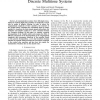Free Online Productivity Tools
i2Speak
i2Symbol
i2OCR
iTex2Img
iWeb2Print
iWeb2Shot
i2Type
iPdf2Split
iPdf2Merge
i2Bopomofo
i2Arabic
i2Style
i2Image
i2PDF
iLatex2Rtf
Sci2ools
113
click to vote
GLOBECOM
2009
IEEE
2009
IEEE
Dual Transform Domain Echo Canceller for Discrete Multitone Systems
Abstract--In communication systems where full-duplex transmission is required, digital echo cancellers are employed to cancel echo by means of adaptive filtering. In order to reduce the computational complexity of these cancellers, the structure of the Toeplitz matrix containing the transmitted signal is usually exploited to transform the time domain signals and perform the emulation and adaptive update in a more convenient domain (e.g. frequency domain). In this paper, we consider a general decomposition of the Toeplitz matrix and examine the effect of different components of the decomposition on the computational complexity and convergence behaviour of the canceller. Based on this general decomposition, a new dual transform domain canceller is proposed which has improved convergence compared to the current echo cancellers and also does not require the transmission of dummy data on the unused tones.
| Added | 16 Aug 2010 |
| Updated | 16 Aug 2010 |
| Type | Conference |
| Year | 2009 |
| Where | GLOBECOM |
| Authors | Neda Ehtiati, Benoît Champagne |
Comments (0)

